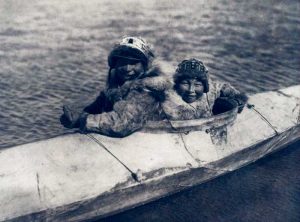Normally when I am reading articles, especially those on a topic outside my field of study, I often gloss over errors or problems with the prose. Sometimes I am halted in midsentence by an utterance that is troubling in terms of its implications, or which suggests something the author likely did not intend.
I found such a sentence when I was reading an article about indigenous people arriving in North and South America and couldn’t help but pause over one sentence about the relative strength and endurance of travelers: “All that kelp, it has been noted, would have provided a rich habitat for sea creatures upon which hearty travelers could feast.”
I read the sentence again, stopping this time at the word hearty. Would the diet of sea creatures have been too much for less hearty travelers, I wondered. If our current gluten-concerned crowd were to stumble on the kelp highway would they not have been hearty enough to feast on the rich banquet? Were only hearty travelers invited along for the feast, and if so, how did the authors know that? If the travelers were present at a feast, did they need to be hearty to arrive, eat, or digest it? I tried to move the word hearty around and see if we can see where it belongs.
“All that hearty  kelp, it has been noted, would have provided a rich habitat for sea creatures upon which travelers could feast.” The kelp is now hearty, which is good news for this already hearty plant. The trouble with the word modifying kelp is that the travelers now have to eat kelp, which, regardless of how hearty it might be, it would doubtlessly cause digestive problems and rapidly make our travelers less hearty.
kelp, it has been noted, would have provided a rich habitat for sea creatures upon which travelers could feast.” The kelp is now hearty, which is good news for this already hearty plant. The trouble with the word modifying kelp is that the travelers now have to eat kelp, which, regardless of how hearty it might be, it would doubtlessly cause digestive problems and rapidly make our travelers less hearty.
“All that kelp, it has been noted, would have provided a rich, hearty habitat for sea creatures upon which travelers  could feast.” The kelp is now ordinary kelp again, but the habitat has been upgraded considerably. Now the coastal habitat is not only rich, but hearty, although the discerning reader will note the words imply the same thing.
could feast.” The kelp is now ordinary kelp again, but the habitat has been upgraded considerably. Now the coastal habitat is not only rich, but hearty, although the discerning reader will note the words imply the same thing.
“All that kelp, it has been noted, would have provided a rich habitat for hearty sea creatures upon which  travelers could feast.” The sea creatures have come off well in this incarnation. Their health would likely have little to do with how easy it would be for the traveler to eat, however. They might be heartier once they were caught, but that might mean they are less likely to be caught and therefore eaten, which means our travelers would be less hearty when they arrived in the new continent, if they didn’t starve outright.
travelers could feast.” The sea creatures have come off well in this incarnation. Their health would likely have little to do with how easy it would be for the traveler to eat, however. They might be heartier once they were caught, but that might mean they are less likely to be caught and therefore eaten, which means our travelers would be less hearty when they arrived in the new continent, if they didn’t starve outright.
“All that kelp, it has been heartily noted, would have provided a rich habitat for sea creatures upon which travelers could feast.” Once I could not use the word as an adjective, I thought it might work better as an adverb. Now, the ones making the observation about the relative heartiness of kelp, habitat, sea creatures, or travelers, are making their statements with a certain heartiness. They are proud of their opinion and state it firmly. Unfortunately, the sentence now draws attention to the ones making the observation instead of the observation itself.
“All that kelp, it has been noted, would have heartily provided a rich habitat for sea creatures upon which travelers could feast.” This modification doesn’t seem much better. Now the provision of the sea habitat is hearty, which is certainly redundant given that the habitat is “rich,” and dwells on the implication that an animate agency is responsible for the construction of sea habitat instead of the travelers who are ostensibly the main interest of the sentence.
“All that kelp, it has been noted, would have provided a rich habitat for sea creatures upon which travelers could heartily feast.” The travelers are now undoubtedly  happier, given that they are not only feasting, which implies the meal to be a good one, but that they are also really engaged. They are face down in the trough, their throats packed and Heimlich attendants at the ready in case some seafood goes awry. Likely the author of the sentence did not intend that the feast would be so bacchian, however. In this incarnation, the sentence says more about the gluttony of the travelers than it does what the sea habitat provided to them.
happier, given that they are not only feasting, which implies the meal to be a good one, but that they are also really engaged. They are face down in the trough, their throats packed and Heimlich attendants at the ready in case some seafood goes awry. Likely the author of the sentence did not intend that the feast would be so bacchian, however. In this incarnation, the sentence says more about the gluttony of the travelers than it does what the sea habitat provided to them.
A rule of writing states that less is more. To employ that, I decided to remove the word entirely. “All that kelp, it has been noted, would have provided a rich habitat for sea creatures upon which travelers could feast.” Once the heartiness of the kelp, habitat, sea creatures, travelers, the providing, and feasting has been removed we can see what little the word contributed. The feasting travelers implies that the repast was hearty, just as the rich sea habitat implies the sea creatures were of quantity and quality enough to make a feast. The travelers do not need to be particularly hearty in order to eat, nor does the kelp need to be much heartier than kelp is normally to provide for the rich habitat. A rich habitat does not need to be extra hearty for the sea creatures, any more than the sea creatures need to be hearty in order to be eaten, especially if one is feasting. The relative heartiness of the verbs, the jovial voice that heartily notes the habitat is rich, or the heartiness of the provision of the habitat, or the hearty feasting, is not essential, and in fact obstructs the meaning of the sentence.
Once I left the word hearty out of the sentence it kept its rather pleasing focus on the travelers and still provided them sea creatures for the feast and yet lost none of its presumed meaning. I understand the impulse that made the travelers hearty, for we have often thought of humans in prehistory as  heartier than us, but for the purposes of the sentence, with the sea habitat so rich, we needn’t give them any more heartiness than they already undoubtedly possessed.
heartier than us, but for the purposes of the sentence, with the sea habitat so rich, we needn’t give them any more heartiness than they already undoubtedly possessed.
This hearty sentence is heartily provided by phys.org: https://phys.org/news/2017-11-anthropologist-group-humans-americas-kelp.html
